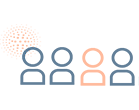Cornelia de Lange Syndrome Precision Panel
Cornelia de Lange Syndrome (CdLS) is archetypical genetic syndrome characterized by intellectual disability, distinct facial features, upper limb anomalies, pernatal and postnatal growth retardation among other signs and symptoms.




